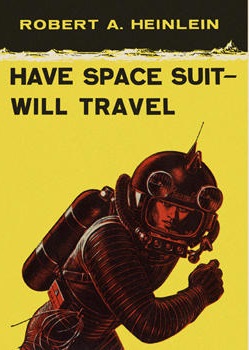Using the panel discussions of the most
recent World Science Fiction Convention in Kansas City in August 2016 (to which
I was invited and had a friend pay my membership! [Thanks, Paul!] but was
unable to go (until I retire from education)), I will jump off, jump on, rail
against, and shamelessly agree with the BRIEF DESCRIPTION given in the pdf copy
of the Program Guide. This is event #2306. The link is provided below…
“Robert A. Heinlein
published 12 books between 1947 and 1958 that were aimed at young adults. Can
children today enjoy them? Let’s take a dive into these books and cast an
appreciative yet critical eye over them.”
Brendan DuBois –
mystery writer and Alternate History author
Dr. Marie Guthrie –
professor at Western Kentucky University specializing in RAH
Dr. Michael Levy –
professor at UW-Stout in Children's and Young Adult Literature. Science Fiction
and Fantasy, and Writing
Alec Nevala-Lee –
science fiction writer, with three books, his short fiction is almost
exclusively in ANALOG
Dr. Janice M
Bogstad – UW-Eau Claire, Head of Technical Services
for the McIntyre Library, academic writer and editor for numerous areas of
speculative fiction
Whew. Now THAT is
a lineup!
What might they
have had to say?
My own personal
opinion is all I can go on here, though others have opinions as well. On the
AMAZING STORIES site, Steve Fahnestalk notes: “So why should a modern young
person read this stuff? My answer is that knowledge—especially of the recent
past, sociologically—is never wasted. Although the customs and morés of our
society may be altered, it helps to know how people used to (as recently as
fifty years ago) talk, act and think. And Heinlein makes that learning
painless, in the same effortless way his characters teach us things about what
is now surely an alternate future society. Where there is science, some of that
is dated too; but the basics of science don’t change. Young people and older
people still interact, and fiction—especially Heinlein’s fiction—is a good way
to teach yourself (just by reading and absorbing) how people interact with each
other. Besides, and I can say this after rereading most of the YA books very
recently, they’re fun to read!” later he adds, “Anyway, you should be aware
that there are many people both attacking and defending Heinlein. Spend a
little time with Google
or Bing; do a little bit of reading
outside the confines of this column, and you might be surprised at what kinds
of things you may find out—and opinions you may read!” (http://amazingstoriesmag.com/2014/05/rah-front-robert-heinlein-continued/)
As I see it,
students – and I work as a high school counselor as well as having been a
science teacher for some 25 years – will read what they want to read. While
some of it depends on what they “have to” read for school, the rest of what
they read is based on word-of-mouth. I’ve never known a kid to buy a book
because of an advertising campaign. They were reading the Harry Potter books
long before Madison Avenue decided it was a “thing” and leapt onto the boat…or
train as the case may be.
The problem I
see is that Heinlein has disappeared from school libraries. Even when I worked
at Barnes & Noble, I ordered a set of the Heinlein juveniles for the
shelves. They disappeared a month later because they weren’t on the “B&N
promotional list”. You could order them, but they were not regularly stocked,
precluding the discovery of the books by browsing teens. When they did appear,
they were relegated to the Science Fiction & Fantasy shelves.
The current
publisher of the books has even attempted to keep up with the times, altering
the covers to fit the “style” student’s expect on their book covers.
As I write
this, The Heinlein Society is working on a graphic novel version of HAVE
SPACESUIT, WILL TRAVEL. Eric Gignac has this to say: “…we believe our team to
be a great blend of comic industry talent and experience held together by the
glue of our love of the genre, the source material, and the writer.”
As parent and
parent-in-law of several young adults, I know that graphic novels are where
young people do their reading as well. Once they read this though, my concern
is that the novels may have disappeared…then what? In answer to the question I posed above, however, I think that the answer is a clear "Yes."
Cover sites: https://upload.wikimedia.org/wikipedia/en/1/11/Have_Space_suit.jpg,
https://i0.wp.com/amazingstoriesmag.com/wp-content/uploads/2015/01/Have-Spacesuit-Will-Travel-by-Robert-Heinlein.-New-English-Library-1978.-Cover-artist-Joe-Petagno.jpg,
http://i0.wp.com/www.tor.com/wp-content/uploads/2014/12/heinlein-have-spacesuit-will-travel.jpg?fit=225%2C%209999&crop=0%2C0%2C100%2C373px,
http://www.sffaudio.com/images/large/FCHaveSpacesuit500.jpg,
https://s-media-cache-ak0.pinimg.com/236x/4d/7d/d5/4d7dd5ccb2c3ce8f49caa6081f8a254c.jpg,
https://i0.wp.com/amazingstoriesmag.com/wp-content/uploads/2015/01/Robert-A-Heinlein_Have-Space-Suit-Will-Travel_DELREY_DKS-1.jpg,
https://pictures.abebooks.com/isbn/9780606004794-us-300.jpg,
http://www.heinleinsociety.org/ths/wp-content/uploads/2016/06/hsswt_newsletter_patch-292x300.jpg


No comments:
Post a Comment